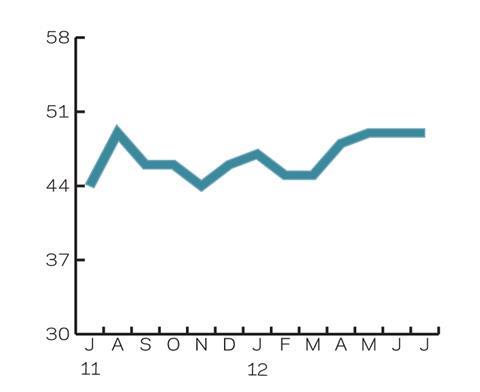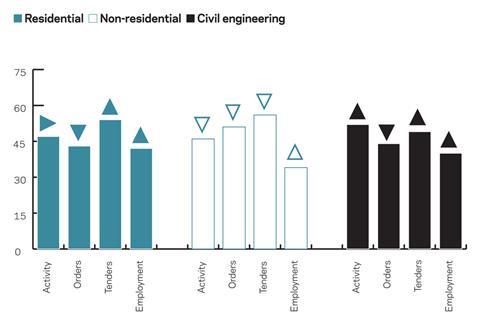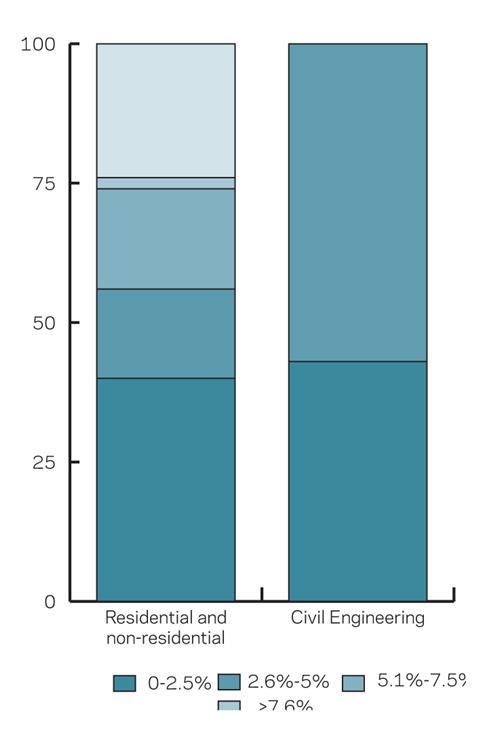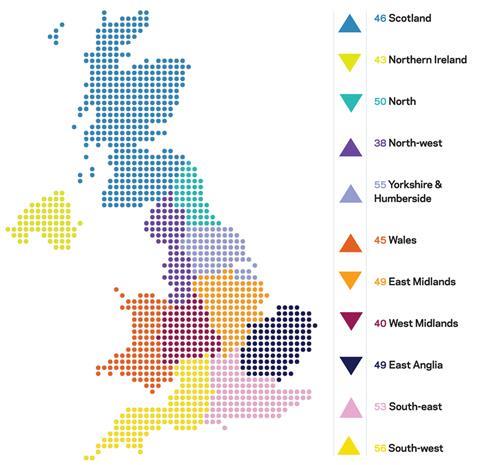Activity in civil engineering was in positive territory in April but decline in the residential and non-residential sectors is still dragging overall activity figures down, according to Experian Economics
01 / THE STATE OF PLAY
Experian’s construction activity index increased by three points to 48 in April and has now been below the no-change mark of 50 in each month since November 2010. Nevertheless, this was its highest reading since August 2011. Activity continued to decline in both the residential and non-residential sectors, but the civil engineering activity index rose by eight points to 52. This was the first time it had been in positive territory for almost a year.
The orders index fell by four points to 43 in April, indicating that orders were below normal for the time of the year. On a sectoral basis, the new orders indices fell across the board during April. The non-residential orders index saw the greatest fall - of four points to 51 - but remained in positive territory for the 26th successive month.
The residential orders index declined by three points to 43, while the fall was less pronounced for the civil engineering sector as the orders index edged down by one point to 44.
After increasing for three successive months, the proportion of firms reporting no constraints on activity declined in April, reaching 14%. This was the lowest level since December 2010. The proportion of respondents reporting insufficient demand as a constraint on their activity rose to 58%, while bad weather also became much more important, with 4% indicating it was impacting on their activity.
Finance also became relatively more important as 21% of business saw this as a limitation on activity, a level not seen since April 2009.
02 / LEADING CONSTRUCTION ACTIVITY INDICATOR

CFR’s leading construction activity indicator suggests construction activity will see the pace of contraction ease in May as the index increases by one point to 49. The index is predicted to linger atthe same level throughout the months of June and July. The indicator uses a base level of 50: an index above that level indicates an increase in activity; below that level a decrease.

03 / labour costs
In April, around 40% of building firms reported that labour costs had fallen on an annual basis, up from 22% three months ago. Around 2% of building firms indicated that annual labour cost inflation was between 5.1% and 7.5%. This is a marked decrease compared to January 2012, when it was reported by 19% of firms.

The majority of civil engineering firms (57%) reported annual labour cost inflation between 0% and 2.5% in April. The rest (43%) indicated that labour costs had fallen on an annual basis. This is a big increase compared to January 2012 where no civil engineering firms reported a fall in labour costs.
04 / regional perspective
Experian’s regional composite indices incorporate current activity levels, the state of order books and the number of tender enquiries received by contractors to provide a measure of the relative strength of each regional industry.
The indices for six regions increased in April. The strongest rise was in Scotland, where the index increased by seven points to a five-month high of 46.

This was closely followed by Wales, where the index went up by six points to 45, its highest reading since September last year.
The Yorkshire & Humberside index saw a four-point increase to 55, remaining above the no-change mark of 50 for a third consecutive month. The South-east index had a three-point rise to 53, while the South-west (56) and North-west (38) indices both increased by one point.
East Anglia saw the strongest fall as its index declined by four points to 49. The East and West Midlands both saw a two-point fall in their indices, taking them to 49 and 40 respectively. The North index declined by two points to 50, while Northern Ireland’s index fell by one point to 43.
The UK index, which includes firms working in five or more regions, declined by four points to 49, taking it into negative territory for the first time since last December.
Notes
The survey is conducted monthly among 800 firms throughout the UK and the analysis is broken down by size of firm, sector of the industry and region. The results are weighted to reflect the size of respondents. As well as the results published in this extract, all of the monthly topics are available by sector, region and size of firm. In addition, quarterly questions seek information on materials costs, labour costs and work-in-hand.
This an extract from the monthly Focus survey of construction activity undertaken by Experian Economics on behalf of the European commission aspart of its suite of harmonised EU business surveys. The full survey results and further information on Experian Economics’ forecasts and servicescan be obtained by calling 020-7746 8217 or logging on to .







No comments yet